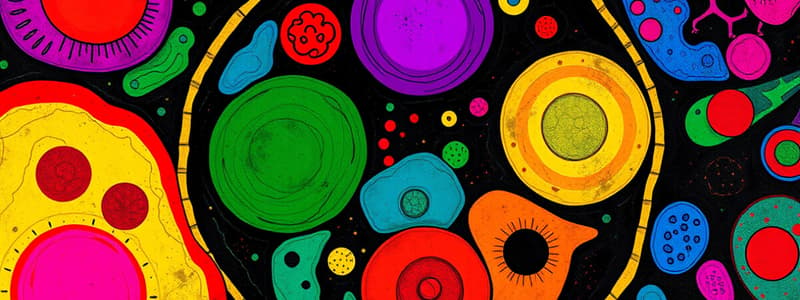Podcast
Questions and Answers
What is the longest phase of the cell cycle?
What is the longest phase of the cell cycle?
- S phase
- M phase
- G2 phase
- G1 phase (correct)
Which phase of the cell cycle includes DNA replication?
Which phase of the cell cycle includes DNA replication?
- M phase
- S phase (correct)
- G0 phase
- G1 phase
What does M-phase primarily involve?
What does M-phase primarily involve?
- Growth and preparation
- Cell signaling
- DNA duplication
- Short dividing phase (correct)
Which phase is NOT a part of interphase?
Which phase is NOT a part of interphase?
What best describes the interphase of the cell cycle?
What best describes the interphase of the cell cycle?
What occurs during the G1 phase of cell division?
What occurs during the G1 phase of cell division?
What is the primary purpose of cell division?
What is the primary purpose of cell division?
During which phase does the actual process of cell division take place?
During which phase does the actual process of cell division take place?
Which of the following correctly describes mitosis?
Which of the following correctly describes mitosis?
What is the G0 phase in the context of cell division?
What is the G0 phase in the context of cell division?
What is the basic unit of life?
What is the basic unit of life?
Which type of reproduction requires two parent cells?
Which type of reproduction requires two parent cells?
Which of the following describes asexual reproduction?
Which of the following describes asexual reproduction?
What characterizes sexual reproduction?
What characterizes sexual reproduction?
Which process enables living things to give birth to their offspring?
Which process enables living things to give birth to their offspring?
What occurs during prophase?
What occurs during prophase?
Which stage marks the complete disintegration of the nucleus?
Which stage marks the complete disintegration of the nucleus?
What happens to chromosomes during anaphase?
What happens to chromosomes during anaphase?
Which of the following is the final stage of karyokinesis?
Which of the following is the final stage of karyokinesis?
Which phase follows the S and G2 phases of interphase?
Which phase follows the S and G2 phases of interphase?
What occurs during telophase?
What occurs during telophase?
What is the primary function of cytokinesis?
What is the primary function of cytokinesis?
During which phase do chromosomes lose their individuality?
During which phase do chromosomes lose their individuality?
Which structure is involved in the process of mitosis?
Which structure is involved in the process of mitosis?
What characterizes the end of cytokinesis?
What characterizes the end of cytokinesis?
Flashcards are hidden until you start studying
Study Notes
Cell
- The cell is the fundamental unit of life, serving as the basic building block of all living organisms.
- Reproduction refers to the process through which living organisms produce offspring.
Types of Reproduction
- Two primary types of reproduction: sexual and asexual.
Sexual Reproduction
- Requires two parent organisms to create offspring, involving genetic contribution from both.
Asexual Reproduction
- Involves a single parent organism, allowing it to produce offspring without the need for genetic contribution from another individual.
- Examples include processes like budding and fragmentation.
Cell Cycle
- The series of processes for DNA duplication and cell division, resulting in two daughter cells.
- Comprising two main phases: interphase (I-phase) and mitotic phase (M-phase).
Interphase (I-phase)
- A lengthy phase where the cell is not dividing but undergoing growth and preparation for division.
- Divided into several sub-phases:
- G1 phase: Initial growth stage, longest phase where the cell grows.
- S phase: Synthetic phase where DNA replication occurs.
- G2 phase: Second growth phase, preparing for mitosis.
- G0 phase: Phase where cells exit the cycle and do not divide further.
M-phase (Mitotic Phase)
- A shorter phase that encompasses actual cell division events, including mitosis and cytokinesis.
Mitosis
- Process of producing two genetically identical daughter cells from a single cell.
- Stages of mitosis include:
- Prophase: Nucleus begins to disintegrate, marking the start of karyokinesis.
- Metaphase: Chromosomes align at the metaphase plate following complete nuclear disintegration.
- Anaphase: Chromosomes are pulled apart, ensuring each daughter cell receives an identical set.
- Telophase: Chromosomes decondense and begin to lose individuality.
Cytokinesis
- Final step of cell division where the cytoplasm divides, resulting in two separate daughter cells.
Types of Cell Division
- Two forms of cell division categorized as mitotic (mitosis) and meiotic (meiosis).
Studying That Suits You
Use AI to generate personalized quizzes and flashcards to suit your learning preferences.




